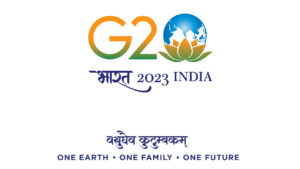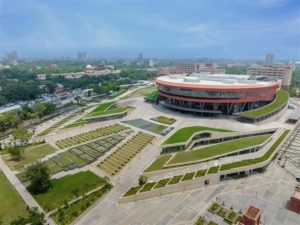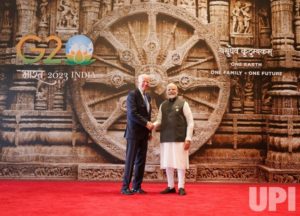The G20 in nutshell
The G20, or Group of 20, is an international forum comprising the world’s major developed and developing economies. It represents approximately 85 percent of the global Gross Domestic Product (GDP), over 75 percent of worldwide trade, and encompasses about two-thirds of the global population. The G20 holds annual Summits, hosted by a rotating member country. Before these Summits, meetings on various topics such as trade, health, and tourism are conducted in that host country in the preceding months.
The culmination of the G20, which took place over two days in New Delhi, India, marks a significant moment in global economic discourse. This international assembly brings together the foremost economies of the world, providing a platform for deliberations on the most pressing challenges confronting the global economic landscape. For India, hosting this summit in 2023 is not only an occasion to display its economic and political influence on the global stage but also an opportunity to engage in substantive discussions with fellow G20 nations on critical issues ranging from climate change to sustainable development and global health.
The G20, formally known as the Group of Twenty, emerged in 1999 in the aftermath of the Asian financial crisis, coalescing around vital concerns including international financial stability, climate action, and sustainable progress. Comprising 19 nations and the European Union, this intergovernmental forum commands a staggering 80 trillion dollars of the global Gross Domestic Product (GDP), accounts for 75 trillion dollars in international trade, encompasses two-thirds of the world’s populace, and occupies 60 million square miles of the Earth’s landmass. This commanding presence solidifies the G20’s standing as a potent forum for international collaboration in economic and financial spheres.
The G20 membership encompasses nations such as Argentina, Australia, Brazil, Canada, China, France, Germany, India, Indonesia, Italy, Japan, Republic of Korea, Mexico, Russia, Saudi Arabia, South Africa, Turkey, the United Kingdom, and the United States, in addition to the European Union. Beyond this core roster, the conference hosts leaders from non-member states and a diverse array of international organizations. With Narendra Modi’s inclusive approach, the African Union has been welcomed into this fold, signaling India’s intent to broaden the forum’s reach. Moreover, in collaboration with Germany, India is championing the idea of granting full membership to all 55 African Union states, positioning itself as a pivotal link between the Global North and Global South in the international arena.
The presidency of the G20 is assigned on a rotational basis, and the host nation is responsible for unveiling the logos and establishing the overarching theme for the year’s meetings. India, for instance, has adopted the lotus as its emblem and the Sanskrit expression ‘Vasudhaiva Kutumbakam — One Earth, One Family, One Future’ as its guiding theme. Additionally, the alternative name for India, Bharat, is also prominently featured.
What is the 2023 G20 logo and its significance?
The emblem chosen for the 2023 G20 Summit holds profound symbolic significance, as articulated in an official government statement. It draws its inspiration from the resplendent hues of India’s national flag – saffron, white, green, and blue. This artful composition juxtaposes the image of our planet Earth with the lotus, India’s revered national flower, which serves as a poignant metaphor for growth amidst adversity. The Earth, in this representation, mirrors India’s steadfast commitment to a pro-planet way of life, one that seeks perfect alignment with the rhythms of nature.

(Image: G20 India 2023 logo)
Prime Minister Narendra Modi unveiled this emblem through a video conference in the preceding year, underlining the unique context of India’s G20 presidency. At a juncture marred by global crises, including the profound reverberations of a disruptive once-in-a-century pandemic, geopolitical conflicts, and a climate of economic uncertainty, the lotus takes on a role of emblematic importance. It emerges as a symbol of hope, a steadfast reminder that even in the most adverse circumstances, the lotus continues to bloom. It embodies the unwavering belief that, even amid profound global turmoil, progress and the potential for positive change persist, guiding us toward the endeavor to make our world a better place.
What is the significance of the G20 theme?
The genesis of the G20 can be traced to a deliberate and thoughtful endeavor. The Prime Minister elucidated, “In our rich Indian heritage, the lotus serves as the revered seat for both the Goddesses of knowledge and prosperity. It embodies what the world yearns for most in this epoch – a collective wisdom that guides us through challenges, and a shared prosperity that extends its reach to the farthest corners and the humblest individuals.” This profound insight underscores why, in the G20 emblem, the Earth finds its place atop the lotus.
The emblem’s seven petals carry a deep significance, symbolizing the seven continents. Notably, seven is also the number of notes that converge in the universal language of music. In musical harmony, when these seven notes come together, they create a seamless concordance. Each note, however, retains its distinctiveness. Analogously, the G20 aspires to forge a global symphony, harmonizing diversity while nurturing unity,” he expounded.
The emblem is designed to encapsulate the essence of ‘Vasudhaiva Kutumbakam’ – the ancient Sanskrit wisdom that proclaims the entire Earth as one extended family. The Prime Minister articulated, “The lotus blossom serves as an emblem of our Puranic heritage, embodying our profound beliefs and the intellectualism of Buddhism.”
As for the overarching theme of the G20, “Vasudhaiva Kutumbakam — One Earth, One Family, One Future,” draws its roots from the timeless Sanskrit verses of the Maha Upanishad, as stated on the official G20 website. It resolutely asserts the intrinsic worth of all life forms – be they human, animal, plant, or microorganisms – and underscores their interconnectedness within the confines of our planet and the broader cosmos.
India’s resounding call for a renewable energy revolution under the banner of ‘One Sun, One World, One Grid’ reverberates through the G20. The nation has also championed the clarion call of ‘One World, One Health’ in its endeavor to fortify global health. Now, within the G20, the resonant mantra is “One Earth, One Family, One Future.” These guiding principles and values of India chart a course toward the collective well-being of the global community” emphasized the Prime Minister.
The theme further casts a spotlight on Life (Lifestyle for Environment), advocating environmentally sustainable and responsible choices both at the individual and national levels. This initiative aims to catalyze transformative actions on a global scale, paving the way for a future that is characterized by greater environmental cleanliness, verdancy, and serenity,” the statement concluded.

Image: With a campus area of approximately 123 acres, the Pragati Maidan Complex proudly holds the title of India’s largest MICE (Meetings, Incentives, Conferences, and Exhibitions) destination.
The Mechanisms of the G20:
The G20 functions through a tripartite framework comprising the Finance Track, the Sherpa Track, and Engagement Groups.
Finance Track: Headed by finance ministers and central bank governors, this segment convenes roughly four times annually. Its purview encompasses fiscal and monetary policy matters, spanning the global economy, infrastructure, financial regulation, financial inclusivity, international financial architecture, and international taxation. Integral working groups within this track delve into specialized domains, including the Framework, International Financial Architecture, Infrastructure, Sustainable Finance, Financial Inclusion, Finance and Health, International Taxation, and Financial Sector Matters.
Sherpa Track: Instituted in 2008 concurrent with the elevation of the G20 to a leaders’ summit, the Sherpa Track comprises envoys representing heads of state. Its focal points lie in socioeconomic imperatives such as agriculture, anti-corruption efforts, climate change mitigation, the digital economy, education, employment, energy policies, environmental stewardship, public health, tourism, trade dynamics, and investment strategies. Each representative in this track bears the designation of a Sherpa, and it encompasses 13 working groups specializing in domains such as Agriculture, Anti-corruption, Culture, Development, Digital Economy, Disaster Risk Reduction, Education, Employment, Energy Transitions, Environment and Climate Sustainability, Health, Tourism, and Trade and Investment.
Engagement Groups: Operating in an unofficial capacity, this track encompasses non-governmental participants and engagement groups that offer recommendations crucial to policy formulation. The Engagement Groups encompass Business20, Civil20, Labour20, Parliament20, Science20, SAI20, Startup20, Think20, Urban20, Women20, and Youth20.
Key takeaways of the G20 Summit 2023
Prime Minister Narendra Modi’s Diplomatic Triumph: The G20 Summit of 2023 stands as a diplomatic milestone for India, as Prime Minister Modi strategically utilized India’s G20 presidency to amplify the concerns of the Global South. On a personal note, these summit outcomes hold great significance for the Indian leader, given the impending general elections next year.
Ukraine Conflict Recognition: Under Modi’s chairmanship, India leveraged its economic influence to secure unanimous support from all G20 member nations for a Leaders’ Declaration acknowledging the conflict in Ukraine without explicitly naming any aggressor. This moves showcased India’s diplomatic finesse and ability to navigate sensitive global issues. Furthermore, PM Modi advocated for a reform of global institutions like the United Nations Security Council (UNSC) to better align with evolving world dynamics, a stance that garnered support from the United States.
Strategic Timing: The timing of the G20 Summit was propitious, coinciding with India’s successful moon landing as part of the Chandrayaan-3 program, which further underscored the nation’s prowess in the realm of space exploration.
Historic G20 New Delhi Declaration: The 2023 G20 New Delhi Leaders’ Declaration, comprising a total of 83 paragraphs, achieved an extraordinary 100 percent consensus among member nations, even with the inclusion of China and Russia. This landmark declaration set a precedent by not containing any footnotes or Chair’s Summary, marking a historic moment in the annals of the G20.
Financial Agreements and Commitments: Embedded within these 83 paragraphs were multiple agreements within the Finance Track. Finance Minister Nirmala Sitharaman highlighted the accomplishments of India’s G-20 Presidency, emphasizing a tangible strategy for bolstering multilateral development banks, a clear regulatory framework for cryptocurrencies, and the implementation of digital public infrastructure to enhance financial inclusivity. Additionally, she stressed the urgency of expediting a debt relief plan for vulnerable nations.
Climate Change Imperative: The declaration placed significant emphasis on addressing climate change, underlining the need to mobilize “US$5.8-5.9 trillion in the pre-2030 period for developing countries” and “US$4 trillion per year for clean energy technologies by 2030” to achieve the goal of net-zero emissions by 2050. It called for a substantial increase in climate funding, transitioning from billions to trillions of dollars to confront the pressing global challenge of climate change effectively. Despite a United Nations report deeming the phase-out of fossil fuels as “indispensable” for achieving net-zero emissions, G20 leaders did not reach a consensus on this critical issue. Collectively responsible for roughly 80 percent of global emissions, the inability to find common ground casts a shadow over upcoming climate deliberations set to commence in the oil-rich UAE this November.
African Union Granted Full G20 Membership: Before this historic development, South Africa stood as the sole African representative within the G20. However, at the G20 Summit in Delhi, the African Union, representing all 55 nations of the African continent, secured full membership akin to the representation accorded to the European Union.
India’s Strategic Advocacy for Developing Nations: India has strategically positioned itself as an advocate for the interests of developing and underdeveloped nations. This positioning aligns with its pursuit of a permanent seat on the United Nations Security Council (UNSC). New Delhi actively seeks support from the African continent, with its 55 crucial votes, to advance this objective.
Inviting Key Nations as ‘Guest Countries’: As part of the G20 summit, India extended invitations to Nigeria, Egypt, and Mauritius, designating them as ‘Guest Countries’ in recognition of their significance in regional and global affairs.
Global Leaders Converge at the Delhi Summit: The G20 Summit in Delhi witnessed the convergence of eminent leaders from across the globe. Notable attendees included Azali Assoumani, the President of the Union of Comoros and Chairperson of the African Union, as well as prominent figures such as German Chancellor Olaf Scholz, French President Emmanuel Macron, British Prime Minister Rishi Sunak, and leaders from Turkey, Canada, Italy, South Korea, and Brazil.
Chinese and Russian Representation: Notably absent from the summit were Chinese President Xi Jinping and Russian President Vladimir Putin. Instead, China was represented by Premier Li Qiang, while Russia sent its Foreign Minister Sergey Lavrov.
The India – Middle East – Europe Economic Corridor (IMEC): A pivotal milestone was reached during the G20 Summit in Delhi with the signing of a Memorandum of Understanding (MoU) involving India, the U.S., Saudi Arabia, the European Union, the UAE, France, Germany, and Italy. This MoU establishes the India – Middle East – Europe Economic Corridor (IMEC), envisaged as an extensive network of transportation routes encompassing railways and sea lanes. Its primary aim is to foster economic development by promoting integration between Asia, the Arabian Gulf, and Europe.
PGII Initiative and IMEC: This project falls under the auspices of the Partnership for Global Infrastructure Investment (PGII), an initiative spearheaded by Western nations to support critical infrastructure projects worldwide. The PGII seeks to secure funding for essential infrastructure development, encompassing roads, ports, bridges, and communication systems, with the overarching goal of bolstering global trade and collaboration. Implicitly, the IMEC corridor is poised to emerge as a credible alternative to China’s Belt and Road Initiative (BRI), which has established comprehensive global connectivity links with the Chinese market over the past decade.
Renewable Energy and Emission Targets: However, the G20 did endorse a commitment to tripling global renewable energy capacity and underscored the imperative for emissions to peak before 2025. Additionally, the Declaration recognized that limiting global warming to 1.5 degrees Celsius necessitates a 43 percent reduction in greenhouse gases by 2030 compared to 2019 levels.
Comprehensive Commitments in G20 Declaration: The G20 New Delhi Leaders’ Declaration featured a host of commitments, including mainstreaming Lifestyle for Environment (Life), advancing sustainable energy transitions, providing sustainable finance, reaffirming the pursuit of Sustainable Development Goals (SDGs), addressing plastic pollution, safeguarding the ocean-based economy, and more. Notably, the summit also marked the launch of the Global Biofuel Alliance (GBA), an organization dedicated to promoting the development and adoption of sustainable biofuels, alongside the establishment of pertinent standards and certification processes.

Image: G20 Summit: Nalanda University’s image forms the backdrop at the greeting area of the President’s dinner for delegates
Parallel Diplomatic Engagements:
Alongside the 2023 G20 Summit in New Delhi, Prime Minister Modi actively engaged in a series of bilateral meetings with global leaders. In a symbolic gesture, he formally passed on the G20 presidential mantle to Brazilian President Lula, expressing confidence in India’s successor to champion worldwide unity and prosperity. These encounters also encompassed discussions on matters of mutual interest.
Of particular note was Modi’s forthright discussion of India’s serious apprehensions regarding extremist elements in Canada, who lend support to secessionist movements, instigate violence against Indian diplomats, and pose threats to the Indian community there. President Biden underscored the enduring partnership between India and the United States, deeply rooted in Mahatma Gandhi’s principle of trusteeship, which resonates between these two nations.
Russia lauded the G20 Summit under India’s leadership as a “breakthrough,” emphasizing its outcomes as a strategic blueprint for tackling global challenges, thereby affirming the vitality and influence of the Global South. Prime Minister Modi also explored avenues for bolstering trade and infrastructure ties with Turkish President Erdogan.
Numerous world leaders at the G20 Summit extended their congratulations to Modi on the successful mission of Chandrayaan-3. Japanese Prime Minister Kishida commended PM Modi for the visionary concept of “Mission Life.” European Commission President Ursula von der Leyen advocated for the establishment of a new global framework for addressing risks associated with artificial intelligence, underscoring the imperative of safeguarding society while fostering responsible AI investments.
In addition, G20 leaders, including U.S. President Joe Biden, UK Prime Minister Rishi Sunak, and UN Secretary-General Antonio Guterres, paid their tributes to Mahatma Gandhi at his memorial, Rajghat, acknowledging the enduring legacy and indelible impact of his ideals.
- The G20 Summit held in New Delhi, India in 2023 marked a significant gathering of leaders from the world’s major economies. This investigative summary seeks to analyze the summit’s key outcomes and assess its overall success.
Key Outcomes:
Expanded Membership: A notable achievement was the inclusion of the African Union as a full member of the G20. This expanded representation reflects India’s strategic diplomacy, positioning itself as a champion for developing nations. India’s leadership in this regard and its engagement with the African continent hold potential implications for global governance and international relations.
Bilateral Diplomacy: Prime Minister Narendra Modi capitalized on the summit’s sidelines for bilateral meetings with global leaders. Notable discussions included India’s concerns about extremist elements in Canada, elevating India-U.S. relations, and forging trade and infrastructure partnerships with nations such as Turkey. These dialogues underscore India’s proactive diplomatic approach to critical issues.
India – Middle East – Europe Economic Corridor (IMEC): The signing of the MoU for the India – Middle East – Europe Economic Corridor was a pivotal achievement during the summit. IMEC, aimed at fostering economic development and integration between Asia, the Arabian Gulf, and Europe, presents India as a key player in global infrastructure initiatives.
Climate Action: While the summit did not yield a consensus on the phase-out of fossil fuels, it did endorse a goal to triple global renewable energy capacity and highlighted the need for emissions to peak before 2025. Additionally, the emphasis on mobilizing trillions of dollars for climate funding signifies progress in addressing the global climate crisis.
Comprehensive Commitments: The G20 New Delhi Leaders’ Declaration featured a wide range of commitments encompassing sustainability, finance, development, technology, and more. Notably, the launch of the Global Biofuel Alliance (GBA) and its focus on mainstreaming Lifestyle for Environment (LiFE) underline the summit’s holistic approach to addressing global challenges.
Assessment of Success:
The G20 Summit 2023 in India can be considered a success for several reasons:
Inclusive Representation: The inclusion of the African Union and engagement with key African nations align with the summit’s theme of “Vasudhaiva Kutumbakam” (One Earth, One Family, One Future), promoting inclusivity and global unity.
Diplomatic Gains: Prime Minister Modi’s strategic bilateral engagements demonstrated India’s diplomatic prowess and proactive stance on international issues, reinforcing its position as a global player.
Infrastructure Development: The IMEC initiative positions India as a leader in global infrastructure development, offering an alternative to China’s Belt and Road Initiative.
Climate Action Progress: While not achieving all objectives, the summit made progress in addressing climate change, emphasizing the need for increased renewable energy capacity and funding.
Comprehensive Commitments: The diverse range of commitments in the G20 declaration underscores the summit’s ambition to tackle multifaceted global challenges.
Conclusion:
The G20 Summit 2023 in India can be deemed a success owing to its inclusive representation, diplomatic achievements, infrastructure initiatives, climate action progress, and comprehensive commitments. India’s leadership in expanding the G20’s reach and addressing global challenges positions it as a crucial player in shaping the future of international cooperation and governance.
Arulnesan & Ojus Tyagi
(Arulnesan, He is interested in writing, creativity, and research. He completed his Bachelor of Education Honors with Second Upper Division from Eastern University of Sri Lanka and earned his Master of Education degree from the Open University of Sri Lanka. Simultaneously, he is pursuing a Post Graduate Diploma in Political Science at the University of Peradeniya and a Master’s Degree in International Relations at the South Asian University of India.He has written articles in various fields such as politics, society, education, mountains, and general issues, which he has published in newspapers and magazines. His passion for writing led him to receive the National Literature Award of Sri Lanka in 2018. He has been actively engaged in various activities and has earned diploma degrees in the fields of media, human rights, human resource management, Sinhala, psychology, Information Technology, and democracy for human rights. Currently, he is actively involved in social, educational, and political research work.
Ojus Tyagi, As an Engineer, Social Scientist, and Artist, Ojus brings a novel framework and understanding to conceptualize and visualize a new world order. As a Master’s student in International Relations at South Asian University, He has been immersed in an enriching academic environment that has equipped him with a comprehensive understanding of global, regional, and local dynamics. His multidisciplinary background enables him to approach challenges from different angles and contribute fresh perspectives to problem-solving. Being interested in the interlinking chains of geopolitics and industrial revolution 4.0, Ojus has been immersed in researching the potentialities of the internet and upcoming technologies and their spillover effects on national and individual sovereignty.)
References
- https://www.reuters.com/world/key-takeaways-2023-g20-summit-new-delhi-2023-09-10/
- https://www.india-briefing.com/news/key-outcomes-of-the-2023-g20-summit-held-in-india-29483.html/
- https://www.nalandaopenuniversity.com/g20-summit-2023-schedule-venue-dates/
- https://www.euronews.com/2023/09/11/new-economic-corridor-new-member-five-key-takeaways-from-the-g20-summit
- https://vajiramandravi.com/upsc-daily-current-affairs/mains-articles/modi-unveils-logo-theme-site-of-g-20-presidency/
- https://www.livemint.com/news/india/g20-summit-nalanda-universitys-image-forms-backdrop-at-greeting-area-of-presidents-dinner-for-delegates-11694282762334.html
- https://www.upi.com/News_Photos/view/upi/d2103ba95d44fe02eb3aa5106792485b/G20-Summit-Kicks-Off-in-New-Delhi-India/





I do not even know how I ended up here, but I thought this post was great. I don’t know who you are but definitely you’re going to a famous blogger if you aren’t already 😉 Cheers!
insurance agentI think that you could do with some pics to drive the message home a little bit,
cheap car insuranceIts like you read my mind! You appear to know so much about this
Hello my loved one! I want to say that this post is amazing, great written and include almost all significant infos. I would like to look extra posts like this.
Attractive section of content. I just stumbled upon your blog and in accession capital to assert that I get actually enjoyed account your blog posts. Anyway I will be subscribing to your augment and even I achievement you access consistently fast.
I was suggested this web site by my cousin. I’m not sure whether this post is written by him as no one else know such detailed about my trouble. You are incredible! Thanks!
insurance agencies near meyour authored material stylish. nonetheless,
insuranceI think that you could do with some pics to drive the message home a little bit,
automobile insuranceI think that you could do with some pics to drive the message home a little bit,
insurance agent salaryI think that you could do with some pics to drive the message home a little bit,
life insuranceI think that you could do with some pics to drive the message home a little bit,
insurance companiesyour authored material stylish. nonetheless,
auto insuranceyour authored subject matter stylish. nonetheless,